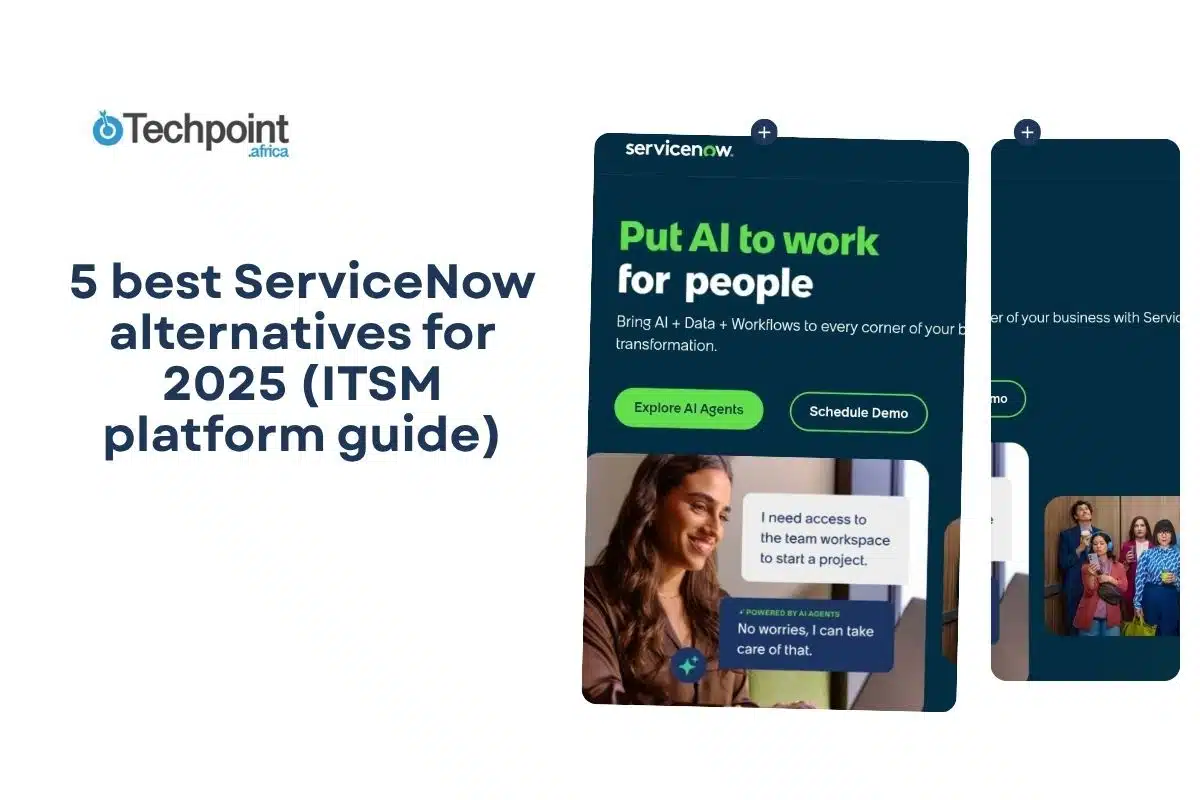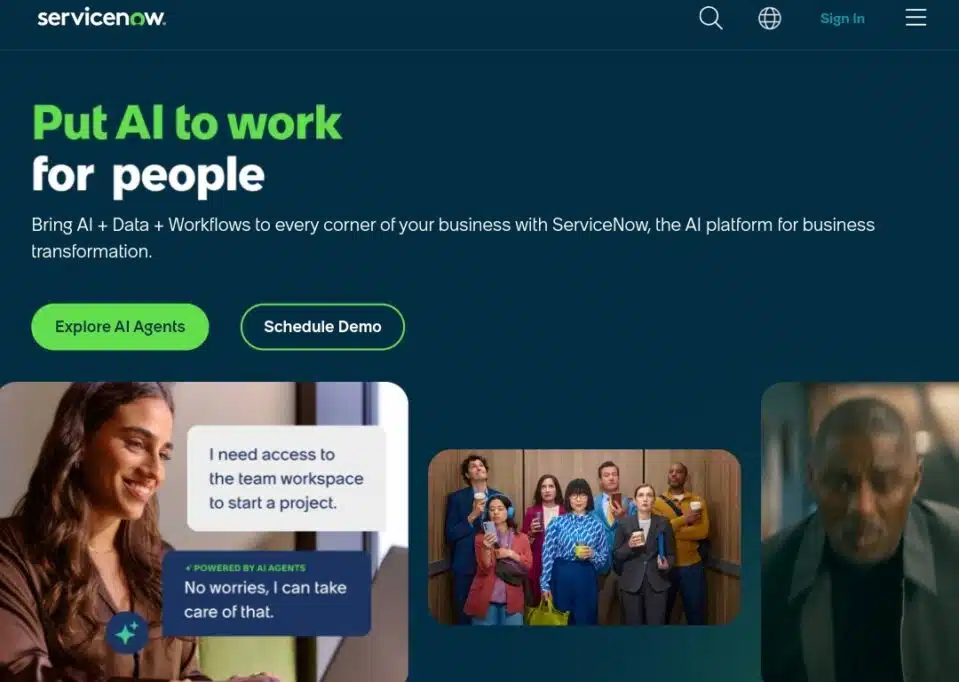
IT service management (ITSM) is crucial for maintaining smooth IT operations. While ServiceNow remains popular, many teams are exploring alternatives that offer flexibility, AI-powered automation, and cost-effective options. We have compiled a list of alternatives for you.
In this guide, you’ll learn:
- The top 5 ServiceNow alternatives for 2025
- Each tool’s pricing, scalability, and automation depth
- Which ITSM solutions fit SMBs, large enterprises, or hybrid IT teams
- Key factors to help you choose the right platform for your goals
Quick-Glance: 5 best ServiceNow alternatives
| Rank | Platform | Best For | Starting Price |
| 1 | Jira Service Management | DevOps-driven IT teams | $0 (Free Plan) |
| 2 | Freshservice | SMBs and mid-sized IT teams | $19/agent/month |
| 3 | Zendesk | Mid-sized to large IT teams | $19/agent/month |
| 4 | BMC Helix ITSM | Large enterprises | Custom pricing |
| 5 | SolarWinds Service Desk | Mid-sized to large orgs | $39/technician/month |
How We Chose These ServiceNow Alternatives
We evaluated platforms based on:
- scalability,
- automation,
- Integration ecosystem,
- pricing,
- ease of us,
- ability to efficiently manage incidents, assets, and workflows, while providing AI-driven insight and;
- suitability for different team sizes and technical complexity levels, from SMB-friendly setups to enterprise-grade environments.
The 5 best ServiceNow alternatives for ITSM (2025)
Jira Service Management (JSM)
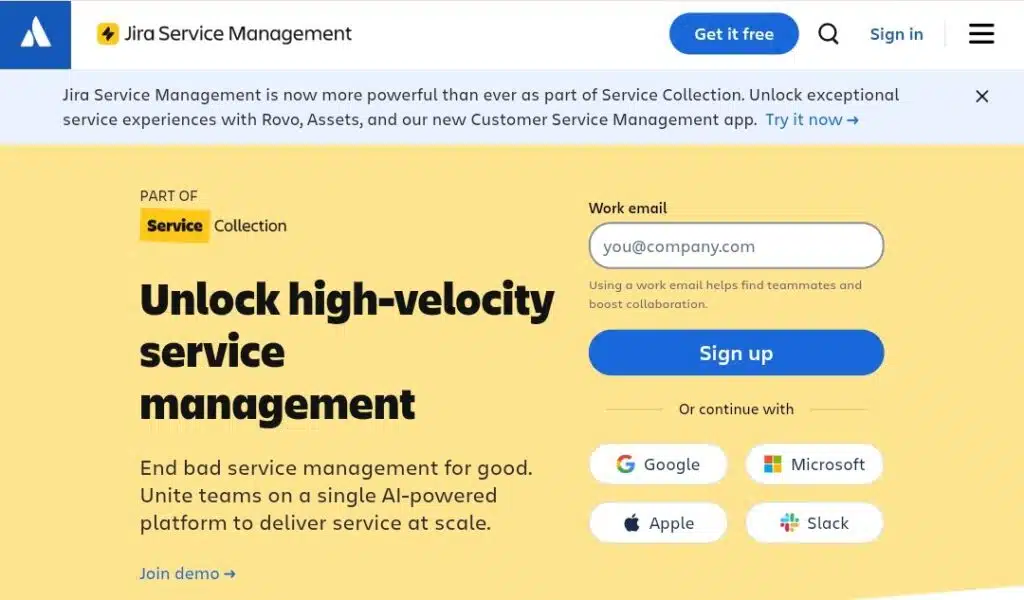
Jira Service Management, built by Atlassian, delivers high-velocity IT service management that unites IT, DevOps, and operations teams on a single AI-powered platform.
Key Features
AI-powered Service Management: JSM automates ticket routing, alert grouping, and incident resolution using Atlassian’s built-in AI and virtual agents. The system intelligently prioritizes requests and provides recommended next steps to reduce manual workload.
Omnichannel Service Desk: The tool consolidates support requests from IT, HR, facilities, and engineering into a single dashboard, giving teams full visibility and faster response times.
Incident and Change Management: It can detect and resolve issues more quickly with automated escalation, post-incident summaries, and change approval workflows that enhance service reliability.
Context-aware Collaboration: Atlassian’s Teamwork Graph connects data across Jira, Confluence, and third-party tools, providing every agent with real-time context on people, work items, and dependencies.
Integrations
Jira Service Management integrates natively with the Atlassian suite, including Confluence for knowledge management, Bitbucket for DevOps pipelines, and Trello for task visualization. Beyond Atlassian products, it also connects effortlessly with collaboration and productivity platforms like Slack, Microsoft Teams, Google Workspace, Loom, and Figma.
Through the Atlassian Marketplace, you can gain access to over 1,000 verified extensions and third-party apps covering asset tracking, monitoring, CRM, and IT operations tools.
Pricing
- Free Plan
- Cost: $0 forever for 3 agents
- Standard Plan
- Monthly: $19.04 per agent/month
- Annually: $18,750 per year (Agent tier: 51-100)
- Premium Plan (Recommended)
- Monthly: $47.82 per agent/month
- Annually: $47,500 per year (Agent tier: 51-100)
- Enterprise Plan
- Cost: Custom pricing
Pros
- It has advanced automation and AI capabilities.
- Deep integration within the Atlassian ecosystem.
- Scalable from small teams to global enterprises.
Cons
- Steeper learning curve for new users.
- Some advanced automation features require higher-tier plans.
Best For:
DevOps-driven or hybrid IT teams that need fast, collaborative service management with built-in automation.
Freshservice
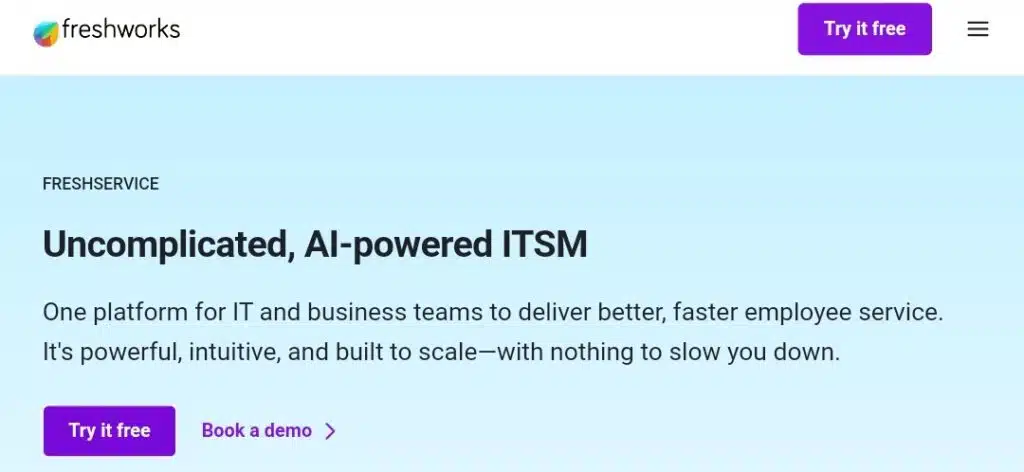
Freshservice by Freshworks is designed for quick setup and effortless automation. It empowers IT teams to manage incidents, changes, and assets on a single, AI-powered platform.
Key Functions
Intelligent Incident Management: Automatically routes tickets to the right agents, leverages AI for contextual recommendations, and generates instant incident reports to help teams detect and resolve issues faster.
Change And Problem Management: Evaluates potential impact using a visual CMDB, automates approval workflows, and applies AI-driven root cause analysis to maintain operational continuity.
Omnichannel And Self-service Support: Unifies communication from email, chat, Slack, Microsoft Teams, and self-service portals into one workspace, ensuring agents have complete visibility across every employee interaction.
Workflow and SLA automations: Enables teams to build no-code workflows, orchestrate multi-step approvals, and apply intelligent SLA policies to prevent service delays and maintain compliance.
Enhanced service intelligence with AI: Powered by Freddy AI, Freshservice provides smart ticket suggestions, language translation, and predictive insights to reduce manual workload and improve response accuracy.
Integration
Freshservice connects with a broad ecosystem of third-party apps and tools, including Slack, Microsoft Teams, Jira, Google Workspace, Azure AD, and Zapier. Its Freshworks Marketplace offers hundreds of pre-built connectors spanning monitoring, project management, and collaboration platforms, allowing IT teams to unify operations without complex development or maintenance overhead.
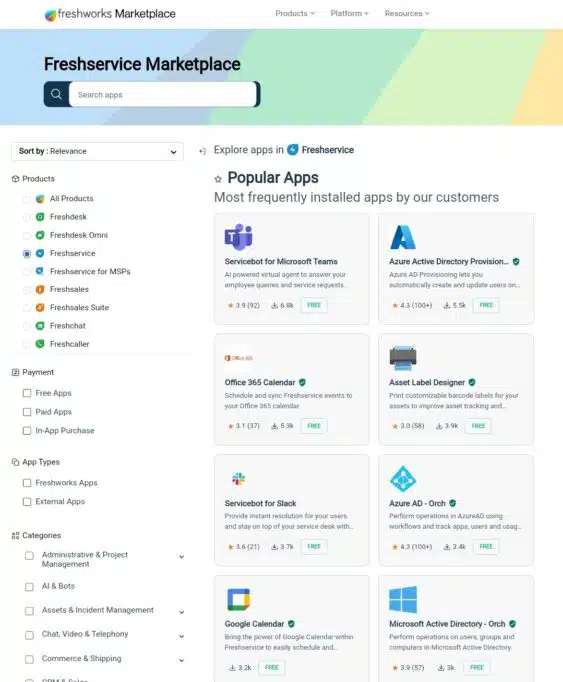
Pricing
- Starter for small teams starting their first service desk and moving away from shared inboxes.
- Monthly: $29/agent/month, billed monthly
- Annual: $19/agent/month, billed annually
- Growth for IT teams building foundational practices to move from reactive to streamlined service delivery.
- Monthly: $59/agent/month, billed monthly
- Annual: $49/agent/month, billed annually
- Pro for advancing teams, breaking silos, and unifying service management across functions.
- Monthly: $119/agent/month, billed monthly
- Annual: $99/agent/month, billed annually
- Enterprise for mature IT organizations driving strategic impact with AI and enterprise-wide service excellence.
Pricing: Custom – Get a quote tailored to your needs
Pros
- Rapid deployment with no-code setup.
- Intuitive UI for non-technical users.
- Strong automation and AI features for IT workflows.
Cons
- Limited customization for complex enterprise environments.
- Some advanced reporting options are only available with higher-tier plans.
Best For
SMBs and mid-sized IT teams seeking an easy-to-use, automation-driven ITSM tool that supports fast onboarding and scalable workflows.
Zendesk
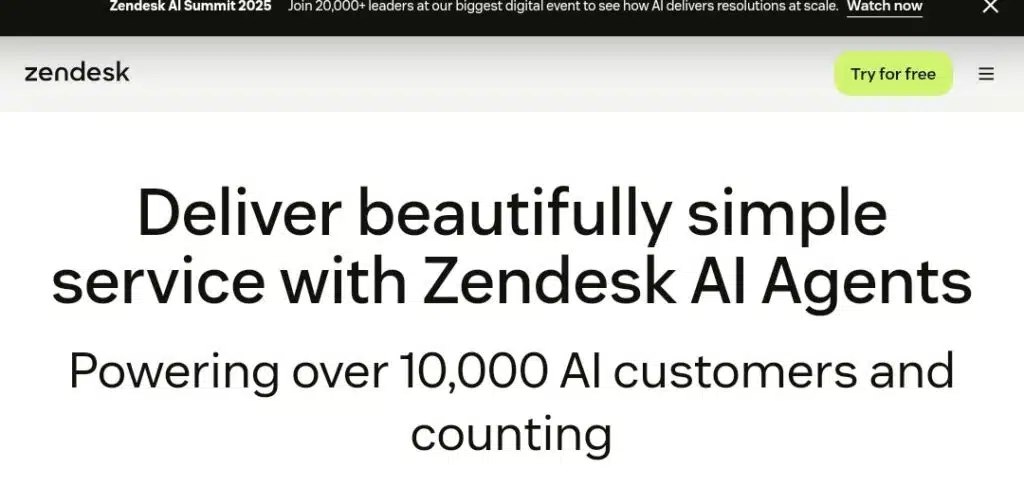
Key Features
AI Agents and Copilot: Zendesk’s built-in AI agents and Copilot handle repetitive queries such as order tracking, refunds, and password resets, allowing you to focus on complex issues. Copilot also suggests following responses, summarizes long threads, and auto-generates ticket notes, helping teams maintain speed and accuracy.
Messaging and live chat: A unified messaging hub supports communication through web chat, email, social media, SMS, and mobile apps. Agents can engage with users in real-time while retaining a full conversation history for context-rich resolutions.
Ticketing System and Help Center: Zendesk provides a centralized ticketing environment that logs, categorizes, and prioritizes every request. Its Help Center integrates with the ticketing system to give agents and users instant access to FAQs and troubleshooting guides.
Knowledge Base Software: AI-generated and agent-curated articles enable easy scaling of organizational knowledge. Content recommendations evolve based on usage analytics, ensuring employees and customers find accurate answers without needing live support.
Advanced Data Privacy And Protection: Security tools enforce role-based access, encryption, and compliance with standards such as GDPR, HIPAA, and SOC 2, ensuring enterprise-grade data integrity across all communication channels.
Reporting and Analytics: Comprehensive dashboards track SLA performance, response times, and customer satisfaction (CSAT). AI-powered analytics identify service gaps, emerging issues, and opportunities for agent training
Workforce and Quality Management: Zendesk offers workforce optimization tools for forecasting, scheduling, and tracking agent productivity. Quality assurance modules monitor interactions to ensure that each ticket meets service standards.
Community Forums and Client Portal: Interactive forums enable users to share feedback, report issues, and discuss solutions, while the customizable client portal provides customers with visibility into their request status and service history.
Integration
Popular integrations include Slack, Shopify, Google Play Reviews, and Jira, which enable agents to collaborate across platforms, view real-time customer data, and unify support operations. For deeper customization, Zendesk provides an open API framework that lets developers build custom connections or publish their own apps directly to the Marketplace.
There is a partnership with certified experts and global implementation partners who assist businesses in integrating CRM, AI, and analytics tools into their Zendesk environment.
Zendesk Marketplace, featuring over 1,200 apps and extensions. These integrations enable teams to tailor workflows, automate customer interactions, and seamlessly connect Zendesk with the tools they already use.
Pricing
- Support Team
- Annual subscription (per agent/month): $19
- Monthly subscription (per agent/month): $25
- Suite Team
- Annual subscription (per agent/month): $55
- Monthly subscription (per agent/month): $69
- Suite Professional Most Popular
- Annual subscription (per agent/month): $115
- Monthly subscription (per agent/month): $149
- Suite Enterprise
- Annual subscription (per agent/month): $169
- Monthly subscription (per agent/month): $219
Pros
- Intuitive interface and minimal setup for IT and support teams.
- Strong automation and AI capabilities for ticket management.
- Extensive third-party integration ecosystem.
- Scalable pricing and features for SMBs to enterprises.
Cons
- Limited deep ITSM modules (e.g., CMDB or advanced change management.
Best For
Organizations seeking a reliable, AI-enhanced service management and customer support platform with strong omnichannel capabilities and simple automation for mid-sized to large IT teams.
BMC Helix ITSM
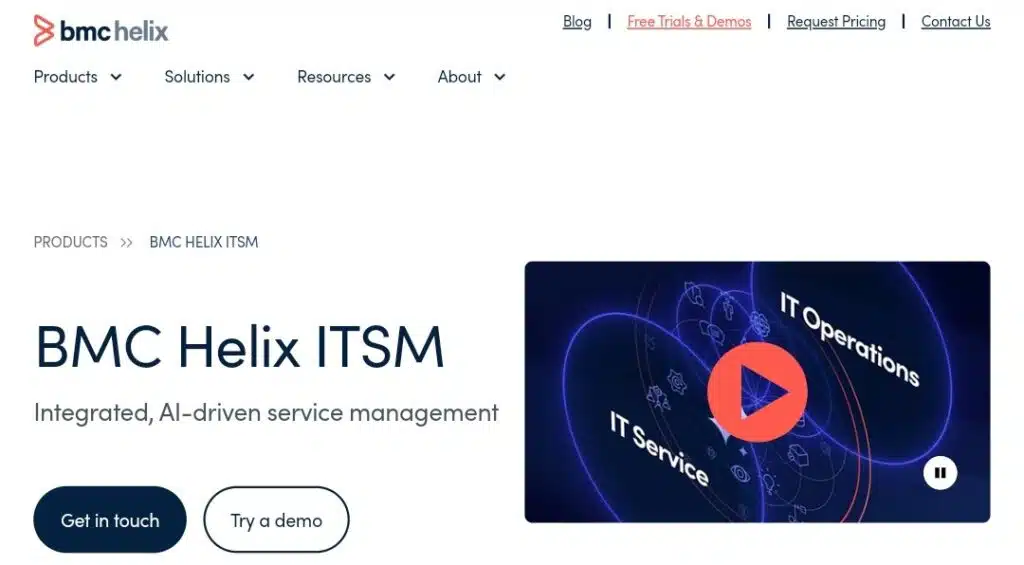
Powered by AI and AIOps, BMC Helix ITSM unifies service and operations management to deliver predictive insights and self-healing automation. It helps large enterprises streamline complex IT environments, accelerate incident resolution, and drive continuous service improvement.
Key Features
AI Agents – Intelligent AI agents assist by automating repetitive tasks, surfacing real-time insights, and providing contextual recommendations to speed up resolutions and reduce operational workload.
Integrated knowledge management – AI consolidates organizational knowledge into a single repository, enabling teams to easily create, share, and access solutions across the enterprise.
Conversational Assistance – AI-powered chatbots and virtual assistants handle end-user requests conversationally, improving satisfaction while reducing ticket volume for support teams.
AI-Driven Incident Clustering – Advanced analytics automatically group related incidents, helping IT teams identify major problems early, detect root causes faster, and prevent widespread service disruptions.
Collaboration and Swarming with AI – Its built-in ChatOps capabilities connect cross-functional teams and tools, enabling real-time collaboration and AI assists by suggesting the right experts or resources for each incident.
Intelligent Change Risk Analysis – Machine learning evaluates historical data and dependencies to predict potential risks associated with configuration or system changes, reducing change-related failures and improving stability.
Integrated Discovery and AIOps – Combines automated discovery with AIOps insights to help IT teams visualize complex dependencies, detect anomalies, and correlate infrastructure data for proactive management.
Unified Service and Operations Management – Links ITSM and IT Operations to create a single, collaborative environment where incidents, problems, and changes are managed holistically with complete visibility.
Knowledge Capture and Learning – Automatically captures insights from resolutions, incidents, and investigations, enriching the knowledge base and continuously improving service delivery.
Integrations
BMC Helix offers a robust integration ecosystem through the Helix Marketplace, supporting over 200 connectors and templates. It integrates natively with platforms like Jira, Microsoft Azure DevOps, Dynamics 365 Sales, AppDynamics, AlertOps, Qualys, Nessus, and Northcraft Analytics (Power BI).
These integrations enable seamless synchronization of incidents, automated alert creation, data sharing, and end-to-end visibility across development, monitoring, and security environments. The Helix iPaaS (powered by Jitterbit) further extends connectivity, allowing enterprises to unify workflows across cloud and on-premises systems.
Pricing
- Typically customised-based
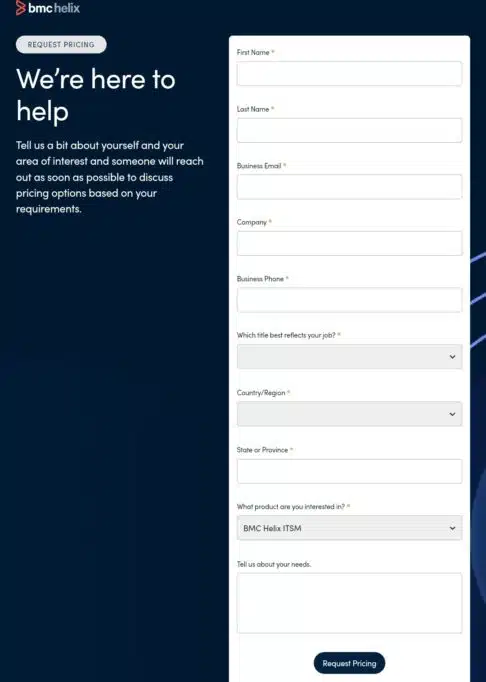
Pros
- Deep ITIL-aligned capabilities with enterprise-grade scalability.
- Advanced AI for automation, risk prediction, and service optimization.
- Strong integrations across DevOps, analytics, and security ecosystems.
- Comprehensive AIOps and discovery tools for proactive IT management.
Cons
- Complex setup and configuration
- Higher cost compared to lightweight ITSM tools.
Best For
Large enterprises or IT-heavy organizations require a fully integrated, AI-driven ITSM platform with advanced analytics, AIOps, and automation to deliver high-performance services and ensure operational resilience.
SolarWinds Service Desk
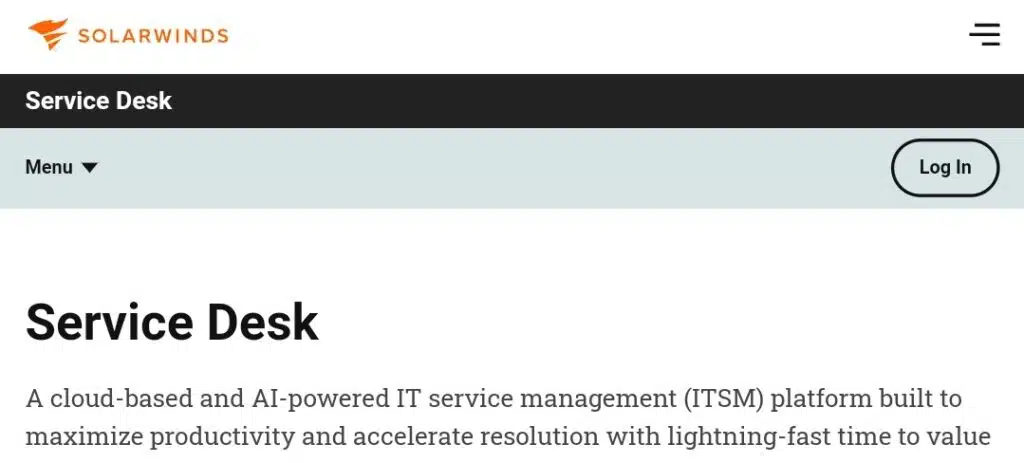
SolarWinds Service Desk is an AI-powered ITSM platform that unifies incident, asset, and change management in a single, easy-to-use interface. Key Features include:
AI-Powered Incident Management: Uses intelligent automation to detect issues, auto-assign tickets, monitor sentiment, and suggest solutions — helping teams resolve incidents faster and more efficiently.
Real-Time Collaboration: Enables live communication and status updates across various channels, including web, email, Microsoft Teams, Slack, and the mobile app, for seamless teamwork.
IT Asset & Configuration Management: Provides complete visibility into hardware, software, and relationships between infrastructure components through an integrated CMDB.
Change management: Ensures stable operations with structured workflows that assess risk, control approvals, and maintain service continuity.
Artificial Intelligence & Automation: Assists agents and users with AI-driven recommendations, predictive insights, and process automation to reduce manual workload.
Enterprise Service Management (ESM): Extends ITSM capabilities across HR, finance, and other departments to standardize service delivery and enhance organizational efficiency
Integrations
SolarWinds Service Desk integrates with over 200 cloud applications, including Microsoft 365, Azure Active Directory, AWS, Google Workspace, Slack, and Microsoft Teams, enabling unified user management and real-time collaboration. For asset and infrastructure visibility, it integrates with VMware vCenter, SCCM, and NMAP, while TeamViewer, LogMeIn, and Dameware support remote troubleshooting.
Automation and workflow extensions are available via Zapier and SolarWinds’ Open REST API, ensuring easy customization and scalability. Additionally, connections with Jira and Zendesk enable synchronized ticket management across systems, providing end-to-end IT service visibility.
Pricing
Service Management: Starts at $39 per technician/month — includes AI-powered workflows for faster issue resolution, centralized service delivery, and improved visibility.
Monitoring & Observability: Starts at $7 per node/month — provides full-stack visibility across on-prem, hybrid, and cloud environments.
Database Monitoring: Starts at $142 per database/month — enables deep diagnostics, performance optimization, and root-cause analysis for major databases.
Incident Response: Starts at $9 per user/month — supports real-time collaboration, automated remediation, and rapid response to critical issues
Pros
- A highly intuitive interface with fast setup and a minimal learning curve.
- Strong AI automation for ticket routing, sentiment analysis, and solution suggestions.
- Excellent integration with SolarWinds’ observability and monitoring tools.
- Robust asset tracking and CMDB for complete infrastructure visibility.
Cons
- Limited customization compared to more enterprise-heavy ITSM tools.
- Reporting and dashboarding options could be more flexible for complex analytics.
Best For
Mid-sized to large organizations seeking an affordable, cloud-based ITSM solution that combines automation, asset visibility, and collaboration across departments.
Comparison table: ServiceNow vs Top alternatives (2025)
Here’s how they stack together:
| Feature | ServiceNow | JSM | Freshservice | Zendesk | BMC Helix | SolarWinds |
| Starting Price | Custom | $0 | $19 | $19 | Custom | $39 |
| Incident Management | YES | YES | YES | YES | YES | YES |
| Asset Management | YES | YES | YES | Partial | YES | YES |
| Automation Workflows | YES | YES | YES | YES | YES | YES |
| Mobile App | YES | YES | YES | YES | YES | YES |
| Integration Options | Extensive | Extensive | Extensive | Extensive | Extensive | Extensive |
| Free Trial | YES | YES | YES | YES | YES | YES |
| Learning Curve | Medium | Medium | Low | Low | High | Medium |
Final takeaways: how to choose the right ServiceNow alternative in 2025
- Freshservice and Zendesk are well-suited for SMBs, while Jira and BMC Helix are better suited for large enterprises.
- Freshservice and SolarWinds are simple to set up, whereas BMC Helix handles complex, ITIL-aligned workflows.
- Jira and Zendesk offer extensive app connectivity, while Freshservice and SolarWinds cover essential apps.
- Freshservice, Zendesk, and Jira are cost-effective options for small teams, whereas BMC Helix requires an enterprise-level budget.
- BMC Helix and Zendesk fit regulated industries, while Freshservice and SolarWinds focus on fast, scalable SMB setups.
Conclusion
Each ServiceNow alternative offers unique strengths. Jira Service Management excels in DevOps collaboration, Freshservice simplifies workflows for mid-sized teams, while BMC Helix ITSM powers enterprise-scale automation. SolarWinds and Zendesk offer AI-driven solutions suitable for a range of budgets.
Try this: explore free trials of 2–3 platforms or request demos for enterprise options to see which one aligns best with your ITSM needs.

